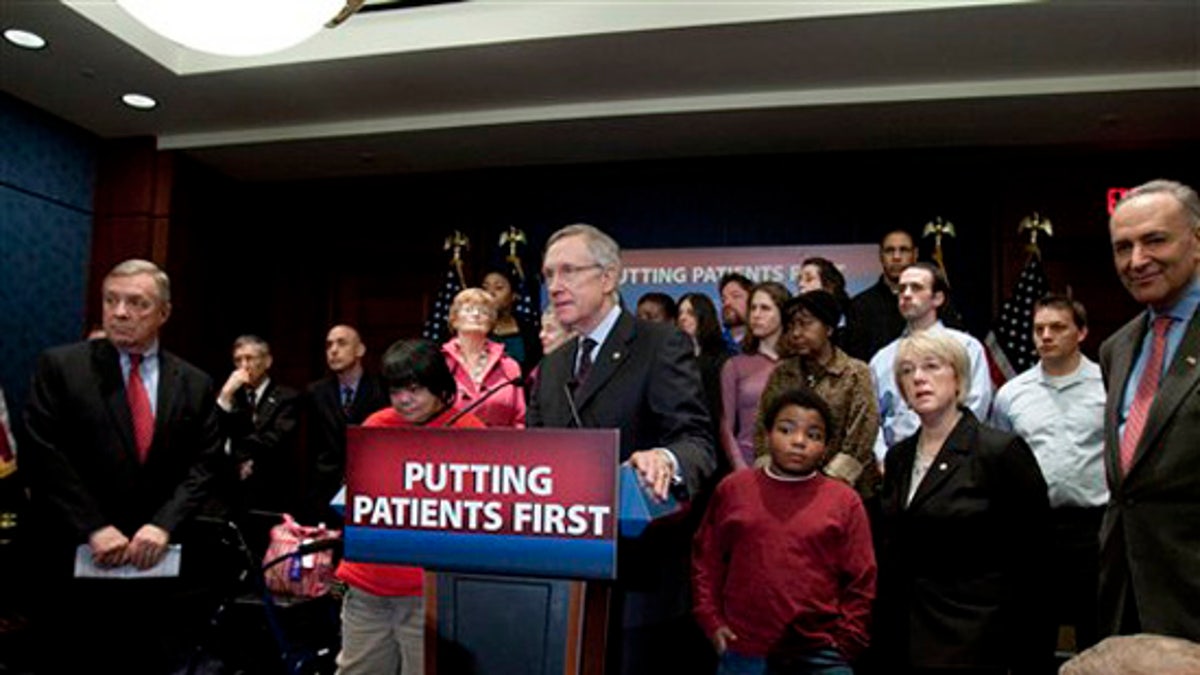
FILE: Senate Majority Leader Harry Reid, seen here in Washington on March 11, is integral to the passage of health care fixes demanded by House Democrats.(AP)
The health care overhaul facing the House this week is being called the biggest faith-based vote ever considered by Congress.
That's because the White House and Democratic leaders, who express certainty that the House will approve a Senate-passed health care bill, insist the widely-reviled bill won't become law even though President Obama must sign it into law before changes demanded by House lawmakers can be made.
Get it?
"Here's what the House Democrats are being asked to do. They're being asked by the president to hold hands, jump off a cliff and hope (Senate Majority Leader) Harry Reid catches them in the Senate after the bill is law," said Sen. Lamar Alexander, R-Tenn.
"Trust the untrustworthy Senate," is the message Rep. Anthony Weiner says Democrats are being asked to do this week. Weiner, D-N.Y., who supports a so-called public option that is not in the Senate bill, suggested in a statement Sunday that trust is a big leap for lawmakers who've seen 290 bills passed by the House ignored by the Senate in the last 14 months.
To make matters more complicated, Democratic leaders are considering an option -- never tried before -- to avoid getting stuck with a recorded "yes" vote on a Senate bill they oppose by using a maneuver that some authorities say is unconstitutional.
The procedural move -- proposed by Rep. Louise Slaughter, D-N.Y., chairwoman of the House Rules Committee, would allow Democrats to usher through the Senate bill (which, by the way, still has a House numerical designation) without actually having a vote "on passage" of the legislation.
"The alarming thing that I'm hearing now is that (House) Speaker (Nancy) Pelosi is thinking about bending the rules and, frankly, making it so there's not a direct vote on the Senate health care bill," Rep. Eric Cantor, R-Va., told "Fox News Sunday."
"I've got the Constitution right here. It's section one -- or Article One, Section 7 that says in all cases the votes of both houses shall be determined by yeas and nays. And right here, we're seeing a perversion of the rules to go ahead and ram through this ... trillion-dollar health care bill," Cantor said.
"We're going to have an up-or-down vote," said Rep. Chris Van Hollen, D-Md., chairman of the Democratic Congressional Campaign Committee, who appeared with Cantor, "whether it's up or down on the Senate bill or up or down on a procedure that would include passage of the Senate bill, recognizing that we're amending the Senate bill."
Even by bending the procedural maneuvers to get the Senate bill through the House, no one can guarantee the Senate will come back and pass "fixes" House Democrats insist be made to win majority support for the Senate bill.
Those fixes include a rescission of amendments like "the cornhusker kickback" or "Louisiana Purchase" -- sweeteners that were placed in the Senate legislation to win recalcitrant Democratic senators.
"I need to see the provisions that affect my home state. I want to see my state treated fairly," said Rep. Eliot Engel, D-N.Y., who added that if things go right the House could vote by the end of the week.
"Every member of the House who wants this bill to go forward has to vote for the cornhusker kickback, has to vote for the Louisiana Purchase," said Rep. Tom Price, R-Ga., warning that those who vote for it "will hear from their constituents loudly and clearly."
"That's what has to pass the House first," he said.
Van Hollen acknowledged that the Congressional Budget Office hasn't yet offered an analysis of the cost of the "fix-it" bill, so even if House Democrats insist on changes to the Senate bill, they can't yet negotiate based on the supposed deficit reduction to be found.
"Of course, we want to see what the Congressional Budget Office says. That's the reason we haven't begun the debate process," he said.
President Obama's senior aide, David Axelrod, on Sunday said the time has come for a vote, regardless of the procedural maneuver used to get the Senate bill through the House.
"We have had a year. Enough game playing, enough maneuvering. Let's have the up or down vote and give the American people the future they deserve," he told ABC's "This Week."
Even while pushing passage, Axelrod admitted the Senate bill is not the president's bill.
"The president's proposal is not the Senate proposal. With the corrections that have been made, with the improvements that have been made, some including Republican ideas, some including Democratic ideas, this is -- this is a different proposal, and I think it addresses some of the concerns that people have had," he said.
Ultimately, it will be the Senate's decision on whether to make any changes to the bill that passed that chamber on Christmas eve, one month before Democrats lost their 60-vote supermajority.
Van Hollen said regardless of how it takes form, House Democrats "need some absolute guarantees from the Senate" that at least 51 senators will support changes
"Whether that takes the form of a letter, whether that takes the president of the United States saying that he has conferred with 51 senators and they're all on board -- whatever form it takes, it has provide assurances to enough House members that they will follow through," he said.
White House Press Secretary Robert Gibbs said he believes the Senate and the House will take up corrections that will become law, but he couldn't guarantee it.
"I think (the president) can give assurances to the House that he's working just as hard to make sure that the Senate passes those corrections as he is in trying to get the House to pass the underlying bill," Gibbs said.
Alexander told CBS' "Face the Nation" that all 41 Republican senators agree to enforce Senate rules, which means for changes to be made through reconciliation, Democrats have to deal strictly with taxing and budget matters. That means issues like taxpayer-funded abortion, which a few House Democrats insist is not adequately covered in the Senate legislation, will not be addressed.
Van Hollen said most Democrats are fine accepting that part of the bill.
"I don't believe we're going to go beyond the Senate language, but I know there are ongoing discussions that have been taking place," he said.




